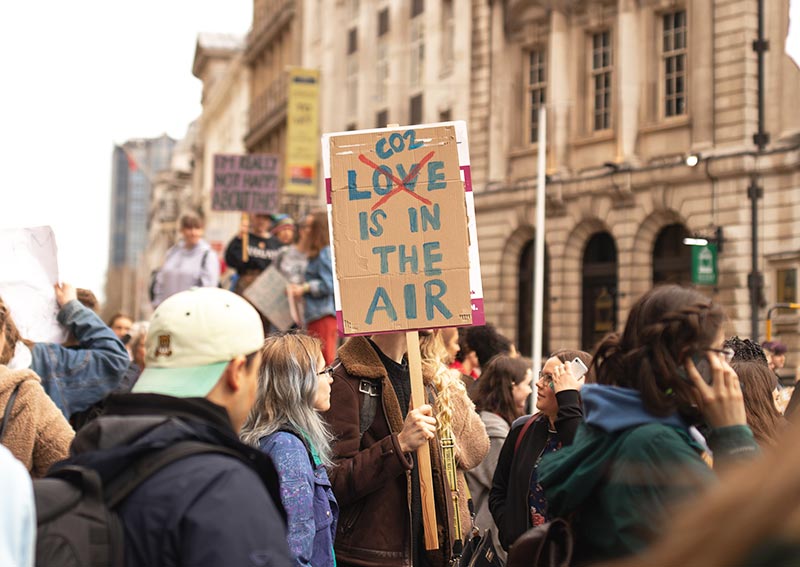What are CO2 equivalents, anyway? Surely you know that CO2 (carbon dioxide) is one of the climate gases that we humans are blowing into the atmosphere in abundance, thus causing the global warming significantly accelerate. To better assess the impact of our own behavior, the emissions of individual activities and products are measured. In addition to carbon dioxide, however, there are many more "man-made" climate gases that need to be taken into account.
In this article I would like to explain why CO2 equivalents provide more clarity in this respect and how they can be calculated.
What are CO2 equivalents?
The term "equivalent" means equivalence. The CO2 equivalent (CO₂e) is therefore a unit of measurement intended to make the effect of all man-made climate gases on the global climate comparable. This is because not all climate gases have the same climate impact and residence time in the atmosphere. The value therefore not only takes into account the production of carbon dioxide, but also includes all other climate gases associated with the respective activity or production.
Internationally, CO2 equivalents are usually referred to as "global warming potential. The term originates from the United Nations Intergovernmental Panel on Climate Change (IPCC).
In short: CO₂ equivalents (CO₂e) are a unit of measurement used to standardize the climate impact of different man-made greenhouse gases.
Why use CO2 equivalents?

Climate change is the biggest environmental problem of our time - but is not based exclusively on our CO2 emissions. With nitrous oxide and methane, there are two other gases that are much more harmful to the climate, which are due to our behavior and remain in the atmosphere longer. Below I have listed the most important climate gases:
- Carbon dioxide (CO2): Our everyday behavior is responsible for an increased proportion of CO2 in the earth's atmosphere. The gas is produced, for example, by road and air traffic or by transporting food halfway around the world. Also through the Deforestation CO2 stored by the trees is released.
- Methane (CH4): The wet cultivation of rice, the thawing of permafrost soils - or when cows, sheep or goats digest their feed - produces methane, a greenhouse gas that is about 21 times more harmful to the climate than CO2. The problem here, of course, is not the animal per se, but the amount of animal Factory Farming keep in cramped pens for our consumption needs.
- Nitrous oxide (N₂O)Nitrous oxide emissions occur primarily on intensively used farmland, where far too much nitrogenous fertilizer is applied. This gas is about 310 times more harmful to the climate than carbon dioxide.₂
As you can see, greenhouse gases are mainly produced in connection with our diet. In the article Nutrition and climate you can learn more about it.
How are CO2 equivalents calculated?
CO2 calculator uses for the calculation of CO2-Use scientific data from research institutes as a basis for your balance sheets. Use for example this CO2 calculator of the Federal Environment Agencyto find out the climate impact of your personal, everyday behavior based on CO2 equivalents.
To compare the CO2 equivalents of food, for example, you can use the Klimateller app or the underlying database from the startup Eaternity use. The so-called Eaternity Score is based on scientific life cycle analyses. The database is continuously maintained by scientists from the Zurich University of Applied Sciences (ZHAW), the University of Zurich (UZH), the Swiss Federal Institute of Technology Zurich (ETH Zurich), the Research Institute of Organic Agriculture (FiBL), Quantis and other institutions. With the help of these figures, you can become aware that every food product affects the climate in some way.
Example: To produce 1 kilogram of beef, about 16,850 grams of CO2 equivalents are released.₃ That's the equivalent of driving more than 89 kilometers by car.₄
"Conversion rate": 189 grams per car kilometer (1 person, gasoline engine, average consumption 6.8 liters).
CO2 equivalents as a meaningful comparison value
Climate change is an environmental problem that is difficult for many people to grasp. After all, it is not as visible as, for example, the Plastic waste in the environment. In addition, the different climate gases as well as their unequal residence time in the atmosphere are confusing. The value of CO2 equivalents brings all these factors down to a common denominator and creates clarity. Converted into car trips, it suddenly becomes more tangible and contributes to the personal motivation of individual people that Protect climate in everyday life.
What do you think of the CO2 equivalent comparison value? I look forward to your comment.
Stay sustainable,

PS.: If you are a frequent flyer and your bad conscience is bothering you, you can for example make a CO2 compensation and support climate protection organizations with a certain amount of compensation.
References:
₁ Norddeutscher Rundfunk: Klimagase Kühe als Klimasünder - Methan und Lachgas, die vergessenen Klimagase (15.12.2009), available at https://t1p.de/b3jj. [07.05.2020].
₂ Norddeutscher Rundfunk: Klimagase Kühe als Klimasünder - Methan und Lachgas, die vergessenen Klimagase (15.12.2009), available at https://t1p.de/b3jj. [07.05.2020].
₃ NAHhaft e.V.: Klimateller App, available at https://www.klimateller.de. [18.05.2020].
₄ Westdeutscher Rundfunk Cologne: CO2 calculator for cars, planes and co. (as of Apr. 26, 2019), available at https://t1p.de/cakx. [07.05.2020].




